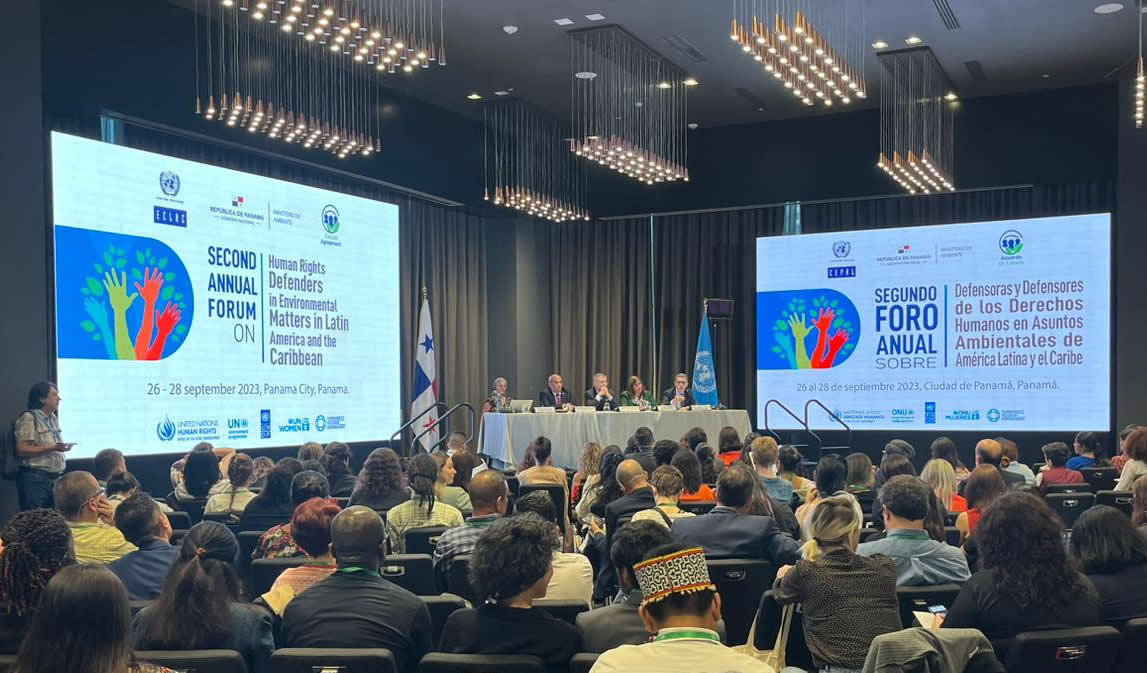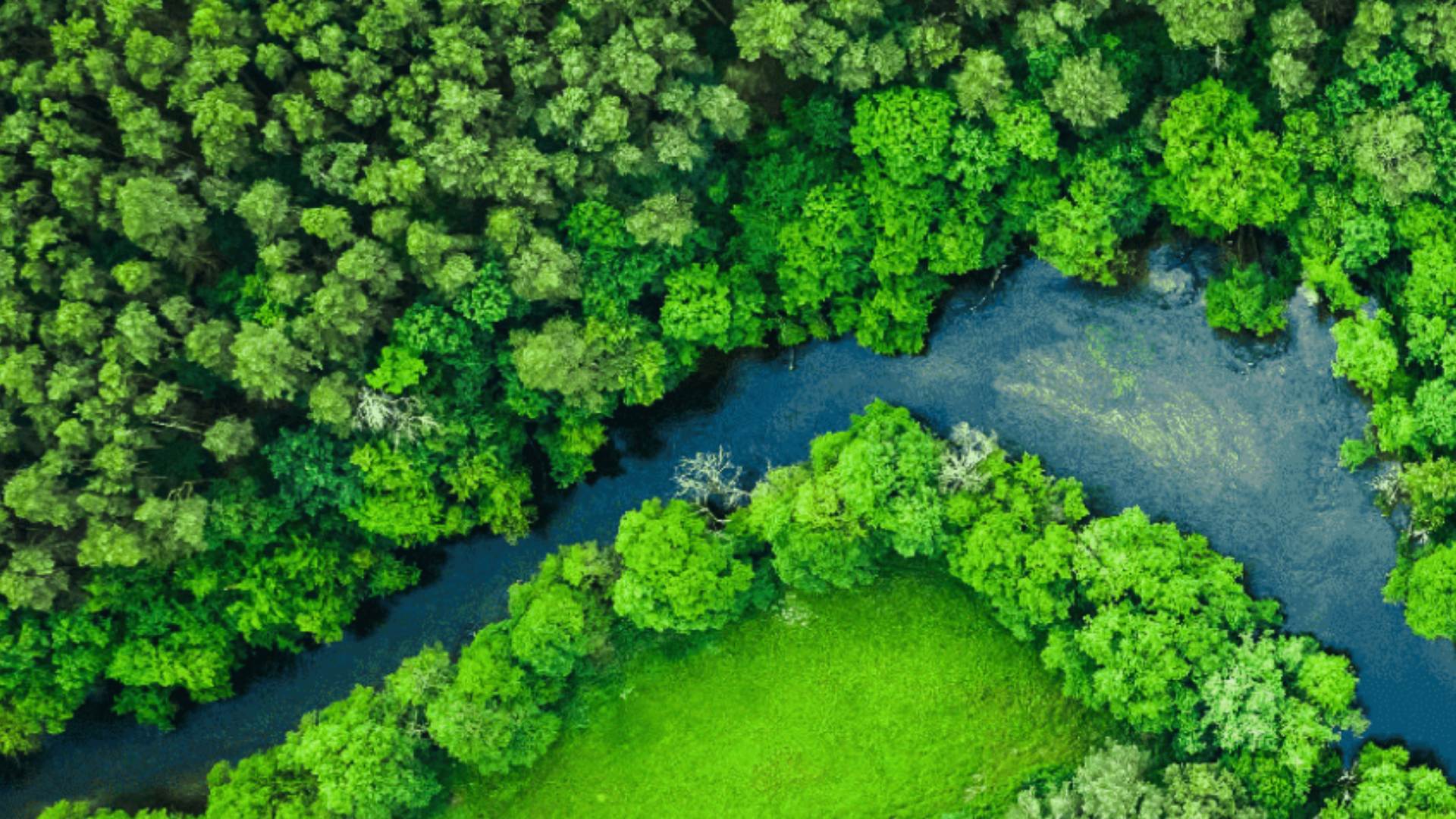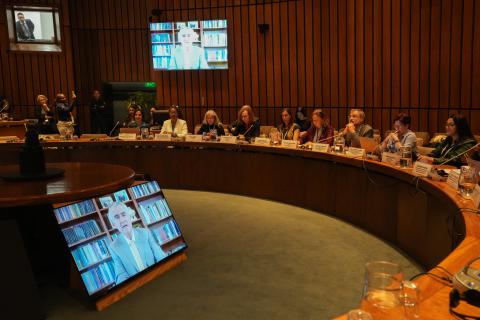Briefing note
The Second Annual Forum on Human Rights Defenders in Environmental Matters in Latin America and the Caribbean began today in Panama City with a call for States and governments in the region to bolster protection and ensure a safe and conducive setting so that environmental defenders can carry out their important work.
The meeting – which will run through Thursday, September 28, 2023 – is organized by the United Nations Economic Commission for Latin America and the Caribbean (ECLAC), in its capacity as Secretariat of the Escazú Agreement, in partnership with the Government of Panama, the Office of the United Nations High Commissioner for Human Rights (OHCHR), UN Women, the United Nations Development Programme (UNDP), the United Nations Environment Programme (UNEP), and the support of the World Bank.
At this Second Forum, participants will address the situation of human rights defenders in environmental matters in Latin America and the Caribbean, share experiences and best practices in the promotion, prevention and protection of environmental defenders, and continue discussions and consultations on the Plan of Action on human rights defenders in environmental matters that will be examined at the third meeting of the Conference of the Parties to the Escazú Agreement (COP 3), which will be held on April 22-24, 2024 at ECLAC’s headquarters in Santiago.
The inauguration of this event was led by Carlos de Miguel, head of the Secretariat of the Escazú Agreement and Officer-in-Charge of ECLAC’s Sustainable Development and Human Settlements Division; Marcelo Cousillas, Director of the Legal Department of the Ministry of Environment of Uruguay, the country serving as Chair of the Presiding Officers of the Escazú Agreement; Nicole Leotaud, elected representative of the public of the Escazú Agreement; Ana Patricia Graça, United Nations Resident Coordinator in Panama; and Milcíades Concepción, Minister of Environment of Panama.
“This Forum is by you and for you. What is being debated here is precisely one of the channels that we have to make an impact on the problems we have in Latin America and the Caribbean. You are the protagonists, we are listening. There are conflicting feelings: on the one hand, there’s happiness, because we are making progress in the region, because we have the Escazú Agreement and we are building forward together, but there’s also sadness, because we have seen very complex testimonies that require urgent solutions that often don’t come about,” Carlos de Miguel said in his welcome remarks.
“A few days ago, the United Nations Secretary-General said ‘humanity has opened the gates of hell,’ in reference to the fact that the northern hemisphere’s meteorological summer in 2023 was the Earth’s hottest since global temperature records were first established. But this is not the only planetary boundary that has been exceeded due precisely to anthropogenic pressures. Six of the nine boundaries that are critical for the Earth’s stability and resilience have been transgressed: biosphere integrity, particularly genetic diversity; changes in the use of land; the use of freshwater; biochemical flows, both of phosphorous and nitrogen; pollution by synthetic chemicals; and climate change. The Escazú Agreement is a unique instrument that we have for ensuring democracy, environmental protection, the rule of law, sustainable development and the defense of individuals and groups in situations of vulnerability,” he added.
Meanwhile, Marcelo Cousillas stressed that the Escazú Agreement is Latin America’s first environmental agreement and is a human rights agreement on environmental matters. But it is also the first international accord that has specific and concrete provisions on human rights defenders in environmental matters, he noted.
“But how do we put these provisions into practice? That is the function of the Action Plan: to give us a roadmap, a target, a way to make them a reality. And to that end, at the Conference of the Parties, States understood that having an open, multitudinous forum, where people could participate with openness and diversity, was a very good way to enrich and contribute to that Plan. The essence of this Forum is to contribute, find and propose mechanisms so that this Plan can be considered again by the Parties at the third conference, which we will hold next year in Santiago, Chile,” he stated.
Speaking on behalf of the public, Nicole Leotaud (of Trinidad and Tobago) highlighted the distinct visions and realities that the Forum’s attendees represent. “Environmental defenders are very diverse and this must be recognized and considered in the Action Plan. Defenders here today and across our region range from indigenous peoples and afrodescendants who face discrimination and estructural inequity and inequalities, but who are determined to protect their territories, cultures, livelihoods and lives,” she indicated.
Meanwhile, Ana Patricia Graça also referred to the UN Secretary-General’s remarks at the 78th General Assembly, which just ended, since they point to the magnitude of the climate action we must implement. “The challenge that lies before us is so big that it requires coalitions like this that include human rights agreements, like the Escazú Agreement. That is why the Escazú Agreement is a living document, it is a milestone in environmental defense with citizen participation and with you, human rights defenders in environmental matters, who perform that crucial role in the context of a notorious climate emergency at all levels,” she said.
At the end of the opening session, Panama’s Minister of Environment, Milcíades Concepción, specially thanked the organizers and those present and stressed the importance of working together to confront environmental problems. “No one environmentalist can resolve the environmental problems of a country, nor can a ministry. We must all be a team, with all countries, with all global organizations. The destruction of our ecosystems is becoming very accelerated, beyond all our governments’ responses, and climate change has worsened this. That is why I am proud to be here with you,” he indicated.
The Second Annual Forum on Human Rights Defenders in Environmental Matters in Latin America and the Caribbean includes four panel discussions to address issues such as the new challenges and risks faced by human rights defenders in environmental matters in Latin America and the Caribbean; lessons and challenges in the implementation of initiatives and mechanisms for the promotion, prevention and protection of the rights of individuals, groups and organizations that defend the environment; the Escazú Agreement as a framework for action: Towards a Regional Action Plan on Human Rights Defenders in Environmental Matters; and national implementation plans and the fulfillment of Article 9 of the Escazú Agreement.
Tomorrow (Thursday, September 28), breakout groups will gather to compile inputs for the elaboration of the regional Action Plan, and the meeting’s conclusions will be presented.



